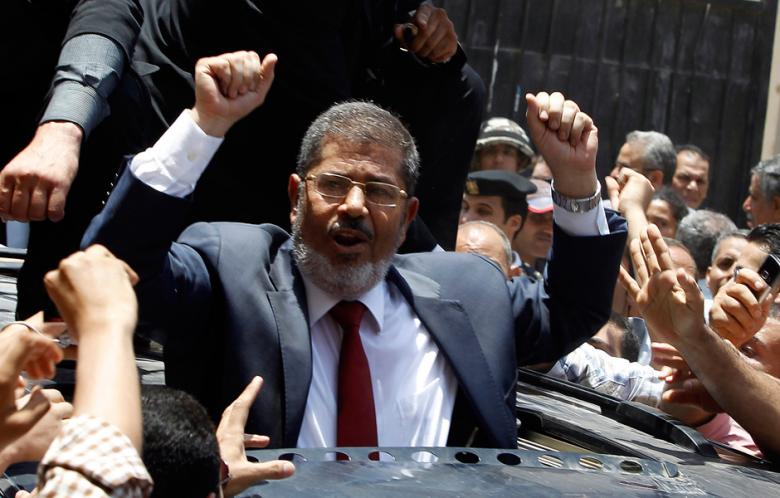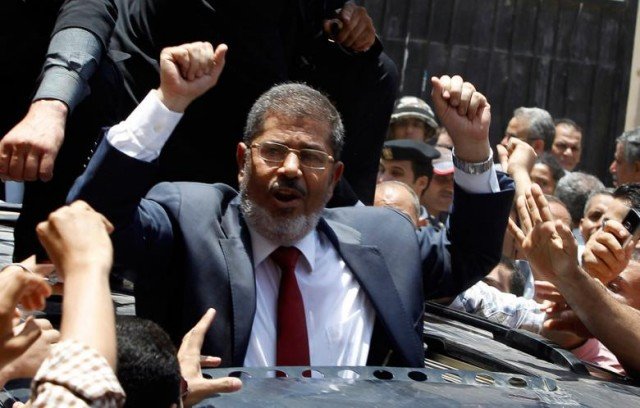
Mohammed Mursi, Egypt’s first democratically-elected president, has started forming a government, after promising to be a leader for all Egyptians.
World leaders have congratulated the Muslim Brotherhood’s candidate, who defeated ex-PM Ahmed Shafiq.
Mohammed Mursi could be sworn in on 30 June, although questions remain over the extent of his authority.
The ruling military council has taken control of many of the president’s powers and has dissolved parliament.
Mohammed Mursi on Monday moved to the presidential office to begin consultations on his cabinet.
Campaign spokeswoman Nermine Mohammed Hassan told Agence France-Presse: “He has already started with a list of names he is considering. He says he will declare the cabinet soon.”
Mohammed Mursi’s priorities will be the battered economy, a deteriorating security situation and the drawing up of the new constitution, correspondents say.
The cabinet appointed by the ruling military is expected to resign on Monday and assume caretaker duties, until Mohammed Mursi’s team takes office.

It appears that Mohammed Mursi is having discussions with Nobel Peace Prize winner Mohamed ElBaradei for the role of prime minister, which would provide reassurance to non-Islamists.
Mohammed Mursi, 60, has promised to appoint a range of vice presidents and a cabinet of “all the talents”.
Shares on Egypt’s main EGX30 index soared on Monday in the first trading since the results were announced, sparking a half-hour suspension. The halt in trading is triggered by a mechanism designed to prevent market fluctuations greater than 5%.
Gains continued on the restart, with the EGX30 on the Egyptian Exchange closing 7.6% up.
In his victory speech on Sunday, Mohammed Mursi urged Egyptians “to strengthen our national unity” and promised an inclusive presidency.
“There is no room now for the language of confrontation,” he said, after the election authorities declared that he had won 51.73% in the 16-17 June presidential run-off.
On hearing the news of his victory, tens of thousands of Muslim Brotherhood supporters cheered in Cairo’s Tahrir Square, chanting, “Down with military rule!”.
Celebrations continued until the early hours of Monday morning, although some protesters remained in the square, saying they would not leave until parliament was reinstated.
Mohammed Mursi paid tribute to the protesters who died in last year’s uprising against former President Hosni Mubarak but also praised the role of Egypt’s powerful armed forces.
“The revolution goes on, carries on until all the objectives of the revolution are achieved and together we will complete this march,” he said.
He also said he would honor international treaties.
Field Marshal Mohamed Hussein Tantawi, Egypt’s military ruler, was among the first to congratulate him on his victory.
The question remains how much real power Mohammed Mursi will have when he swears the oath of office.
He will not have a sitting parliament or a permanent constitution to define his powers or duties.
And the Supreme Council of the Armed Forces (SCAF), which has led Egypt since last year’s revolution, has issued a series of recent decrees.
• The justice ministry gave soldiers the right to arrest civilians for trial in military courts until the ratification of a new constitution
• A decree was issued dissolving parliament after a court ruling that the law on elections to the lower house of parliament was invalid
• The SCAF granted itself legislative powers and reinforced its role in the drafting of a permanent constitution
• Field Marshal Tantawi announced the re-establishment of a National Defence Council, putting the generals in charge of Egypt’s national security policy
Because of the dissolution of parliament, it is unclear where the new president will take his oath of office.
The Muslim Brotherhood has been seeking a partial recall of parliament so that he is sworn in before MPs. However, the Mena news agency quoted a Muslim Brotherhood spokesman as saying the oath would be taken before the Supreme Constitutional Court.
Responding to Mohammed Mursi’s election, the White House called the result “a milestone for Egypt’s transition to democracy”.
Israeli Prime Minister Benjamin Netanyahu said on Monday: “We expect to work together with the new administration on the basis of our peace treaty.”
There was confusion over an alleged interview quoted by Iran’s semi-official Fars news agency. Fars said Mohammed Mursi planned to expand relations with Iran to “create a balance of pressure in the region”, but his spokesman denied the interview had taken place.